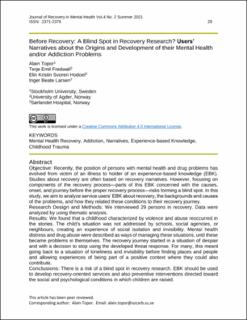| dc.contributor.author | Topor, Alain Pierre | |
| dc.contributor.author | Fredwall, Terje Emil | |
| dc.contributor.author | Hodøl, Elin Kristin Svoren | |
| dc.contributor.author | Larsen, Inger Beate | |
| dc.date.accessioned | 2022-03-28T06:18:08Z | |
| dc.date.available | 2022-03-28T06:18:08Z | |
| dc.date.created | 2021-07-08T13:14:14Z | |
| dc.date.issued | 2021 | |
| dc.identifier.citation | Topor, A. P., Fredwall, T. E., Hodøl, E. K. S. & Larsen, I. B. (2021). Before Recovery: A Blind Spot in Recovery Researc0h? Users’ Narratives About the Origins and Development of their Mental Health and/or Addiction Problems. Journal of Recovery in Mental Health, 4 (2), 29-47. Retrieved from: https://jps.library.utoronto.ca/index.php/rmh/article/view/36989 | en_US |
| dc.identifier.issn | 2371-2376 | |
| dc.identifier.uri | https://hdl.handle.net/11250/2987781 | |
| dc.description.abstract | Objective: Recently, the position of persons with mental health and drug problems has evolved from victim of an illness to holder of an experience-based knowledge (EBK). Studies about recovery are often based on recovery narratives. However, focusing on components of the recovery process—parts of this EBK concerned with the causes, onset, and journey before the proper recovery process—risks forming a blind spot. In this study, we aim to analyze service users’ EBK about recovery, the backgrounds and causes of the problems, and how they related these conditions to their recovery journey. Research Design and Methods: We interviewed 29 persons in recovery. Data were analyzed by using thematic analysis. Results: We found that a childhood characterized by violence and abuse reoccurred in the stories. The child’s situation was not addressed by schools, social agencies, or neighbours, creating an experience of social isolation and invisibility. Mental health distress and drug abuse were described as ways of managing these situations, until these became problems in themselves. The recovery journey started in a situation of despair and with a decision to stop using the developed threat response. For many, this meant going back to a situation of loneliness and invisibility before finding places and people and allowing experiences of being part of a positive context where they could also contribute. Conclusions: There is a risk of a blind spot in recovery research. EBK should be used to develop recovery-oriented services and also preventive interventions directed toward the social and psychological conditions in which children are raised. | en_US |
| dc.language.iso | eng | en_US |
| dc.publisher | Ontario Shores Centre for Mental Health Sciences | en_US |
| dc.rights | Navngivelse 4.0 Internasjonal | * |
| dc.rights.uri | http://creativecommons.org/licenses/by/4.0/deed.no | * |
| dc.title | Before Recovery: A Blind Spot in Recovery Research? Users’ Narratives About the Origins and Development of their Mental Health and/or Addiction Problems | en_US |
| dc.type | Peer reviewed | en_US |
| dc.type | Journal article | en_US |
| dc.description.version | publishedVersion | en_US |
| dc.rights.holder | © 2021 The Author(s) | en_US |
| dc.subject.nsi | VDP::Medisinske Fag: 700::Helsefag: 800 | en_US |
| dc.subject.nsi | VDP::Samfunnsvitenskap: 200::Psykologi: 260 | en_US |
| dc.source.pagenumber | 29-47 | en_US |
| dc.source.volume | 4 | en_US |
| dc.source.journal | Journal of Recovery in Mental Health | en_US |
| dc.source.issue | 2 | en_US |
| dc.identifier.cristin | 1921019 | |
| cristin.qualitycode | 1 | |

